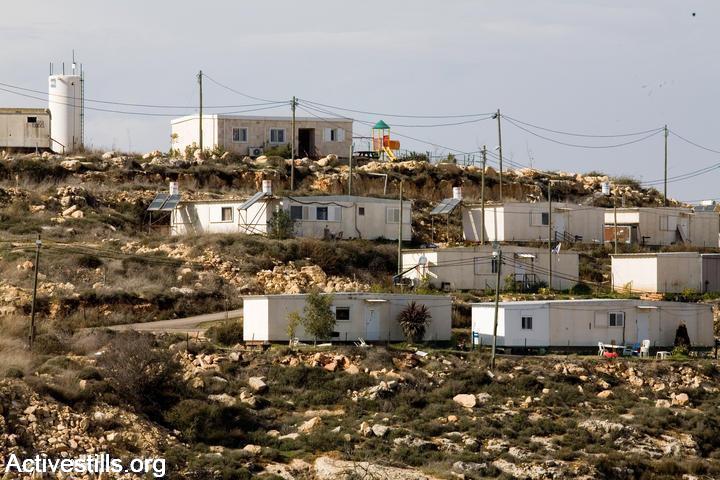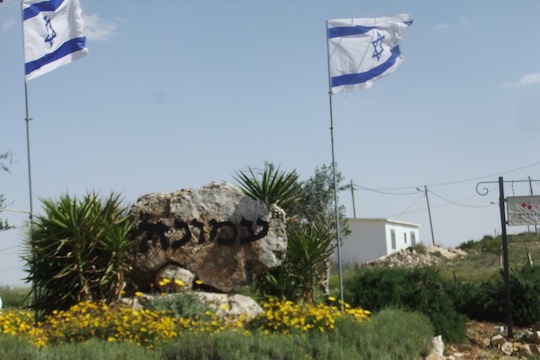The government never authorized the wholesale annexation of the West Bank. That’s why it’s doing it behind everyone’s backs.
By Yesh Din, written by Yossi Gurvitz
Our previous post on Yesh Din’s new position paper, “From Occupation to Annexation,” explored the various ways the Israeli government implements the Levy Report. This post will focus on another critical point: the erasure of the Palestinians’ right to property.
Prior to the Levy Report, the Israeli government was careful to avoid legalizing the seizure of private Palestinian property, except when it could argue it was done due to pressing military needs (“military seizure”) or by declaring it state land and claiming that it was never, in fact, private property at all. This took place, in part, because the laws of occupation demand that the occupier protect the private property of protected persons in occupied territory. The legal appeals against the illegal outposts, about 80% of which are at least partially built on private Palestinian land, challenged this way of thinking.
And then came the Levy Report, which claimed the government has the right to build settlements and outposts in the West Bank. On paper this claim may have been harmless, had its implementation not directly threatened the property of private persons.
Let’s look at some examples. The future of the Adei Ad outpost – which was at the heart of another one of our reports, “The Road to Dispossession” – is being debated by the High Court of Justice. The report detailed how Israeli civilians took over private Palestinian land while using violence against Palestinian residents who tried to hold on to their land, all while the Israeli authorities stood aside. Although the report was published in 2013, the reality it describes continues even today.

As our position paper shows, the Israeli government relies on Levy’s exceedingly broad legal interpretation to legalize a series of illegal outposts, under the pretense they are in fact neighborhoods of already existing settlements – even when they are outside the jurisdiction of their “mother settlement.” Justice Minister Ayelet Shakedeven boasted that “anyone who knows the Adei Ad [appeal], knows that the state responds differently these days.”
Therefore the state informed the High Court that although the outpost was illegal, it does not intend to remove it. On the contrary, it announced that it would try and legalize it. In practice, then, what Shaked meant to say was that “we decided to give criminals a prize.”
If the state told the court in 2008 that it – some day — intends to enforce the law and evacuate the outposts, its position had radically changed by 2011. Now, said the state, it will enforce the law only vis-a-vis structures built on private land, while legalizing structures built on state land. The Levy Report came out in 2012; by 2013, the state was telling the courts that in some cases “state reasons” may supersede the need to enforce the law. By 2015, the state spoke expressly about retroactive legalization.
Another case that represents the erasure of Palestinian property rights is that of Amona. Amona is the largest illegal settlement outpost in the West Bank – a significant part of the land on which it stands belong to Palestinian residents, whose theft was followed by violence against the Palestinians. In court, the state opposed the evacuation of Amona time after time. At the end of 2014, the High Court of Justice ruled that Amona was to be evacuated by the end of this 2016. So what did the government do? Did it accept the ruling and follow the instructions of the court? Of course not. It tried to bypass the court through a new bill titled the “re-ordering bill.”
This law follows one of the comments made in the Levy Report, according to which compensation for Palestinians whose land has been taken from them is preferable to evacuating the invaders. Once it can be proven that an outpost was illegally built on Palestinian land, the Palestinian owners would be forced to accept compensation and give up their rights to their own property.
According to the Levy Report, therefore, all people are equal before the law, but some are more equal. You own land? Jewish invaders took it with government aid? We won’t evacuate them, we simply legalize the invasion. Here are your 30 pieces of silver. Oh, you don’t want to take them because you’re afraid of living next to Israelis who have already proven their affinity for violence? You won’t take the silver because you don’t want to take part in Jewish expansion over parts of Palestine? Tough. Your property rights are secondary to our historical rights. Do yourself and us a favor and take the money, because, you see, this outpost won’t be removed. It will remain here whether you like it or not. The court ruled otherwise? We’ll try and change the law. What about your rights? What rights?
The bill currently names three outposts and a part of a settlement – three outposts that the court had already ordered be removed, and one whose case is still debated. Amona is mentioned specifically as an outpost covered by the bill. Politicians are not even trying to conceal the fact the point of the bill is to prevent the High Court from slowing down the violation of Palestinian rights. Just in case, the bill – which has been frozen for the time being – allows other outposts to be added to it even after it passes.
The state’s responses to the court and the “re-ordering bill” deal outposts whose fate were either ruled on by the High Court or are still being debated. But the government ministers, being people of vision, take care not only of the past and present but also of the future. The “re-ordering committee,” created by Prime Minister Netanyahu, is supposed to provide other solutions, as it has a mandate to “examine the current process of evidence needed for proof of land ownership.” To put it more bluntly: its purpose is to make it even more difficult for to prove they are landowners. The purpose of the committee is to create “an outline for the legalizing of structures and neighborhoods in Jewish settlements in Judea and Samaria that were built with the support of the authorities.”

The Israeli government never authorized the Levy Report’s recommendations while effectively endorsing and carrying them out in secret. The government implements an unofficial policy of annexation – one that does not grant equal rights to those being annexed, while at the same time depriving them of the legal defenses they are entitled to as protected persons, since, allegedly, there is no occupation.
As for the people who live there? It’s their own problem. They should have lived someplace else. Didn’t they get the hint already?
Written by Yossi Gurvitz in his capacity as a blogger for Yesh Din, Volunteers for Human Rights. A version of this post was first published on Yesh Din’s blog.



